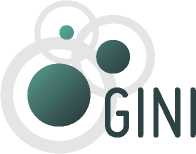Comparable Indicators of Inequality Across Countries
Information on the GINI project
Aims
The core objective of GINI is to deliver important new answers to questions of great interest to European societies:
What are the social, cultural and political impacts that increasing inequalities in income, wealth and education may
have? For the answers, GINI combines an interdisciplinary analysis that draws on economics, sociology, political
science and health studies, with improved methodologies, uniform measurement, wide country coverage, a clear
policy dimension and broad dissemination.
Methodologically, GINI aims to:
• exploit differences between and within 29 countries in inequality levels and trends for understanding the im-
pacts and teasing out implications for policy and institutions,
• elaborate on the effects of both individual distributional positions and aggregate inequalities, and
• allow for feedback from impacts to inequality in a two-way causality approach.
• The project operates in a framework of policy-oriented debate and international comparisons across all EU
countries (except Cyprus and Malta), the USA, Japan, Canada and Australia.
Inequality Impacts and Analysis
Social impacts of inequality include educational access and achievement, individual employment opportunities
and labour market behaviour, household joblessness, living standards and deprivation, family and household for-
mation/breakdown, housing and intergenerational social mobility, individual health and life expectancy, and so-
cial cohesion versus polarisation. Underlying long-term trends, the economic cycle and the current financial and
economic crisis will be incorporated. Politico-cultural impacts investigated are: Do increasing income/educational
inequalities widen cultural and political ‘distances’, alienating people from politics, globalisation and European
integration? Do they affect individuals’ participation and general social trust? Is acceptance of inequality and poli-
cies of redistribution affected by inequality itself? What effects do political systems (coalitions/winner-takes-all)
have? Finally, it focuses on costs and benefi ts of policies limiting income inequality and its effi ciency for mitigat-
ing other inequalities (health, housing, education and opportunity), and addresses the question what contributions
policy making itself may have made to the growth of inequalities.
Support and Activities
The project receives EU research support to the amount of Euro 2.7 million. The work will result in four main
reports and a final report, some 70 discussion papers and 29 country reports. The start of the project is 1 February
2010 for a three-year period. Detailed information can be found on the website.
www.gini-research.org

GROWING INEQUALITIES’ IMPACTS
Page • 41
More intriguing information
1. Disturbing the fiscal theory of the price level: Can it fit the eu-15?2. HEDONIC PRICES IN THE MALTING BARLEY MARKET
3. The Tangible Contribution of R&D Spending Foreign-Owned Plants to a Host Region: a Plant Level Study of the Irish Manufacturing Sector (1980-1996)
4. The name is absent
5. The name is absent
6. The name is absent
7. The open method of co-ordination: Some remarks regarding old-age security within an enlarged European Union
8. Psychological Aspects of Market Crashes
9. The name is absent
10. Momentum in Australian Stock Returns: An Update